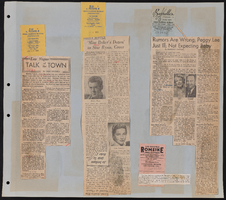Search the Special Collections and Archives Portal
Search Results

Charles Scott Emerson oral history interview: transcript
Date
Archival Collection
Description
Oral history interview with Charles Scott Emerson conducted by Claytee D. White on December 21, 2017 for the Remembering 1 October Oral History Project. In this interview, Charles Scott Emerson discusses his work with the American Red Cross and the disaster relief the organization provided during the aftermath of the October 2017 mass shooting in Las Vegas, Nevada. The interview begins with a discussion on Emerson's early life and career in Missouri and how he moved to Las Vegas in 2004. Emerson talks about the American Red Cross response plans and coordinated operations that are in place for when the community is faced with a disaster, going into specific detail on the community-wide response to the October 1, 2017 shooting. He gives a behind-the-scenes glimpse into how relief work is organized, using this interview as a chance to praise the hidden heroes of the October 2017 tragedy, including the people at the Family Assistance Center, the Attorney General's Office, the Driver's License Bureau, and the Coroner's Office, as well as mental health providers, child care workers, blood donors, and more. Throughout the interview, Emerson puts special emphasis on the importance of community in order to offer support in the aftermath of a tragedy as well as to prevent a man-made tragedy from occurring again.
Text

Photograph of the Flamingo Hotel gaming room entrance, Las Vegas, circa late 1940s-early 1950s
Date
Description
Image
Alan Paine Papers
Identifier
Abstract
The Alan Paine Papers are largely comprised of the works written by poet and screenwriter Alan Paine, including his screenplays, a manuscript for an unpublished book, and
Archival Collection
Las Vegas Astronomical Society Records
Identifier
Abstract
The Las Vegas Astronomical Society Records (1981-2003) focus on the early history of the Society. The collection contains membership information, descriptions of the organization's founding by both its first director and first president, a copy of the Society's newsletter from 2003, and color slides from 1981 and 1982 that document the Society's early activities.
Archival Collection
The Collection of Newspaper Clippings on Thomas Hanley
Identifier
Abstract
The Collection of Newspaper Clippings on Thomas Hanley is comprised of photocopied newspaper articles from the
Archival Collection
White Cross Drug Store Scrapbook
Identifier
Abstract
The White Cross Drug Store Scrapbook (1950-1964) contains photographs, employee training materials, newspaper clippings, advertisements, displays, and some historical narrative and press release material on the history and mission of the White Cross Drug Store. It also includes advertising ephemera and brochures on cosmetic products and perfumes of the early 1950s.
Archival Collection
Circus Circus Enterprises Scrapbook
Identifier
Abstract
The Circus Circus Enterprises Scrapbook consists of articles from 1984 related to the Circus Circus Las Vegas Hotel and their investment properties. The scrapbook includes articles on the entertainment, dining, real estate, and management of Circus Circus Enterprises in Southern Nevada.
Archival Collection
Elizabeth Casper Photograph Collection
Identifier
Abstract
The Elizabeth Casper Photograph Collection, approximately 1947 to 1960, contains photographic prints and slides that document the childhood of artist and schoolteacher, Elizabeth Casper, and her family life in Las Vegas, Nevada. Included are images of Casper and her family as well as the Helldorado parade, civic celebrations, churches, a nursery school, and casinos in Las Vegas.
Archival Collection
Monty Brandt Photograph Collection
Identifier
Abstract
The Monty Brandt Photograph Collection consists of black-and-white photographic prints of the White Cross Drug Store on Fremont Street in Las Vegas, Nevada from 1924 and 1955. Images include views of Fremont Street, as well as interior and exterior views of the White Cross Drug Store.
Archival Collection

